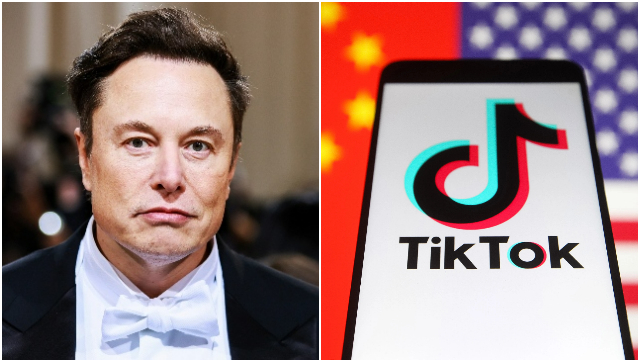The Unlikely Marriage of TikTok and Elon Musk: A Case for Caution
)
The Unlikely Marriage of TikTok and Elon Musk: A Case for Caution
In a world where technology and social media giants seem to be ever-expanding tentacles of influence and power, the idea that Elon Musk might purchase TikTok's U.S. operations seems to be the stuff of science fiction. Yet, recent reports suggest that this very scenario could unfold if the Chinese-owned platform cannot stave off a looming U.S. ban. But is this really the solution we should be rooting for? Let's take a closer look at why this merger might not be the panacea it appears to be.
The Illusion of a Solution
On the surface, selling TikTok's U.S. operations to Elon Musk might seem like an ingenious way to sidestep national security concerns. After all, Musk has a proven track record of shaking up industries—from electric cars with Tesla to space travel with SpaceX. Surely, he could bring a fresh perspective to the social media landscape. However, this potential acquisition raises more questions than it answers.
Firstly, Musk's track record in social media is less than stellar. His acquisition of Twitter, now rebranded as X, has been fraught with controversies and hiccups. Users have criticized changes to the platform's algorithm, and advertisers have been hesitant to invest, leading to financial instability. If Musk were to take the reins of TikTok, it’s worth asking whether he would bring the same chaos to a platform that, despite its controversies, remains immensely popular.
Moreover, the notion that transferring ownership from a Chinese company to an American billionaire would automatically resolve national security concerns is overly simplistic. The heart of the issue lies in data privacy and the potential misuse of user information. While moving TikTok under Musk's control might change its ownership, it doesn't inherently alter the data protection mechanisms that are already in place—or improve them.
The Musk Effect: Is Bigger Always Better?
Elon Musk is undeniably a visionary, but vision alone does not guarantee success. His business ventures often reflect his larger-than-life persona: ambitious, daring, and sometimes reckless. While this approach has worked in industries like automotive and space exploration, social media requires a different touch. It is a realm where user engagement and community trust are as important as innovation.
Consider Musk’s handling of Twitter/X. Despite his efforts to revitalize the platform, it has seen a decline in user engagement and trust, particularly among those concerned about privacy and content moderation. Critics argue that Musk’s focus on free speech has often come at the expense of community guidelines, resulting in a platform that is sometimes seen as a haven for misinformation and harassment. Bringing this ethos to TikTok could alienate its diverse user base, which ranges from teenagers creating dance videos to educators sharing valuable insights.
Furthermore, Musk's tendency to use social media platforms as a personal soapbox could prove problematic. His tweets have been known to sway stock markets and stir controversies, raising questions about impartiality and corporate responsibility. If Musk were at the helm of TikTok, how might his personal brand of communication influence the platform's direction and reputation?
The Geopolitical Chess Game
It's essential to view the potential sale of TikTok within the broader context of U.S.-China relations. The platform's rise to prominence has been met with skepticism from American lawmakers, who fear that Chinese government influence could lead to data breaches or propaganda. However, TikTok has repeatedly asserted that its U.S. operations are independent of Chinese government control. ByteDance, TikTok's parent company, claims that the Chinese government's "golden share" has no bearing on its global operations.
Yet, the U.S. government's stance remains firm, with the Supreme Court appearing inclined to uphold a law that could force a sale or ban TikTok in the U.S. by January 19. This legal pressure has accelerated discussions about selling TikTok's U.S. operations, but such a move could set a dangerous precedent. If the U.S. government can compel a foreign company to sell its assets based on national security concerns, what's to stop other nations from doing the same to American companies abroad?
Moreover, the sale of TikTok to an American entity might not quell geopolitical tensions. In fact, it could exacerbate them. China could perceive such a move as an economic aggression, prompting retaliatory measures that could affect other U.S. businesses operating in China. This tit-for-tat dynamic could lead to a protracted trade war, with consumers and businesses on both sides of the Pacific caught in the crossfire.
The Path Forward: Rethinking Solutions
Rather than rushing into a sale, it might be more prudent to explore alternative solutions that address the underlying concerns without resorting to drastic measures. One possibility is enhancing regulatory oversight to ensure that TikTok complies with stringent data privacy standards, similar to those enforced by the General Data Protection Regulation (GDPR) in Europe. By implementing robust protections and transparent data practices, TikTok could demonstrate its commitment to safeguarding user information.
Another option is fostering international cooperation to establish global standards for data privacy and security. Such an approach would require diplomatic engagement and compromise but could ultimately lead to a more stable and secure digital ecosystem. Encouraging dialogue between the U.S. and China, rather than escalating tensions, could pave the way for mutually beneficial solutions.
Finally, it's crucial to remember that social media platforms are not monolithic entities. They are ecosystems shaped by the content and behavior of their users. Encouraging digital literacy and responsible online behavior can empower users to recognize and combat misinformation, reducing the need for heavy-handed interventions.
Conclusion: A Call for Cautious Optimism
The potential sale of TikTok's U.S. operations to Elon Musk presents a tantalizing yet perilous proposition. While it might seem like a quick fix to national security concerns, it risks creating more problems than it solves. Instead of viewing this scenario as a silver bullet, we should approach it with cautious optimism, recognizing the complexities involved and exploring more nuanced solutions.
As we navigate the intricacies of the digital age, it's imperative that we prioritize user privacy, data protection, and international cooperation. By addressing these core issues, we can ensure a safer and more equitable digital future—one that values innovation without compromising integrity.

Keychron V1 QMK Custom Mechanical Keyboard
A versatile 75% layout wireless mechanical keyboard. Perfect for programming with Mac/Windows compatibility and exceptional build quality.


